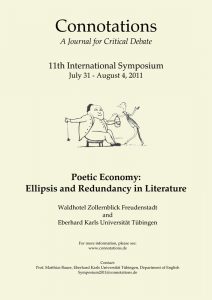Poetic Economy: Ellipsis and Redundancy in Literature
11th International Connotations Symposium
You can find the articles that followed up this symposium in its special issue behind the link.
July 31 - August 4, 2011
Eberhard Karls Universität Tübingen
Freudenstadt
Zollernblick-Lauterbad
“Poetic Economy: Ellipsis and Redundancy in Literature” is about a seemingly contradictory topic: how can literature be both, elliptic on the one hand and excessive and redundant of words and other elements of language on the other? One way of resolving these apparent contradictions would be to consider the question of “too little” or “too much” not in absolute but in relative terms. An aphorism may have too many words and a Victorian novel may lack the very words needed for a reader to regard it as a success. But this leaves us with the tricky question of decorum: what is the idea or purpose to which a particular number of words is appropriate and by which we measure the verbal economy of a literary work of art?
The venue was be a beautifully situated hotel in the Black Forest (near Freudenstadt), which is partly owned by Tuebingen University (see http://www.zollernblick-lauterbad.de).
As the emphasis of the Connotations symposia is on critical debate, talks were be 30 minutes, leaving another 30 minutes for discussion.
Programme
Monday, August 1
9:00 Matthias Bauer (Eberhard Karls Universität Tübingen): Welcome and Introduction
9:30 Rajeev S. Patke (National University of Singapore): 'Elegance' and Poetic Economy in John Crowe Ransom and F. T. Prince
10:30-11:00 Coffee Break
11:00 Frank J. Kearful (Rheinische Friedrich-Wilhelms-Universität Bonn): A Field of Forces: Robert Lowell's "The March 1" and "The March 2"
12:00-13:30 Lunch
13:30 Judith Saunders (Marist College, Poughkeepsie, NY): Poetic Analogy: Its Simultaneously Replicating and Generative Function. Billy Collins's "Albany" as Illustrative Example
14:30 Edward Lobb (Queen's University, Ontario): Aposiopesis and Ellipsis in "The Love Song of J. Alfred Prufrock"
15:30-16:00 Coffee Break
16:00 Neil Browne (Oregon State University): The Economy of Loss and Abundance in Walt Whitman's "When Lilacs Last in the Door-yard Bloom'd" and Allen Ginsberg's Howl
17:00 Raymond−Jean Frontain (University of Central Arkansas): Emily Dickinson and the Delay of Ecstasy
19:00 Dinner
Tuesday, August 2
8:30 Carmen Dörge and Angelika Zirker (Eberhard Karls Universität Tübingen): Ellipsis and Redundancy in John Donne's Poetry
9:30 Inge Leimberg (Westfälische Wilhelms-Universität, Münster): "Thy words do finde me out." Reading the last line of "Affliction (I)"
10:30-11:00 Coffee Break
11:00 Robert Crosman (University of Alaska, Anchorage): Shakespeare & Poetic Economy: The Example of The Sonnets
12:00 Arthur Kinney (Renaissance Center, University of Massachusetts Amherst): John Lyly's Poetic Economy
13:00-14:00 Lunch
14:00 Sven Wagner (Ruhr-Universität Bochum): The Case for Figurativity in English-Language Haiku
15:00 Aida Suleymenova (Far Eastern Federal University, Vladivostok, Russia): Ellipsis or jitarazu in the Japanese poetry tanka and haiku (the poetic calculation and the image contextualization)
16:00-16:30 Coffee Break
16:30 Teresa Brus (University of Wrocław, Poland): "AND" as Terminus Technicus in Louis MacNeice's Autumn Journal
19:00 Dinner
Wednesday, August 3
8:30 Hannes Bergthaller (National Chung-Hsing University, Taiwan): "Self-destruction from Excess of Self": Edgar Allan Poe's "The Fall of the House of Usher"
9:30 Elena Anastasaki (The Open University of Greece): 'Leaps and Bounds': Hawthorne's Strategies of Poetic Economy
10:30-11:00 Coffee Break
11:00 Maurice Charney (Rutgers University, NJ): Pinter's Fractured Discourse in The Homecoming
12:00 David Fishelov (Hebrew University, Jerusalem): The Economy of Literary Interpretation
13:00-14:00 Lunch
14:30 Excursion to Mummelsee; afterwards Dinner at Zollernblick
Thursday, August 4
9:00 Margit Peterfy (Johannes Gutenberg Universität Mainz): Pictorial Imagination as Poetic Economy: Flannery O'Connor's Use of Geometry and Color in Selected Short Stories
10:00-10:30 Coffee Break
10:30 William Harmon (University of North Carolina, Chapel Hill): "Mistah Kurtz—he dead" in Company: Redundancy and Ellipsis
11:30 Maik Goth (Ruhr-Universität Bochum): Verbal and Narrative Economy in Richard Hughes's A High Wind in Jamaica
12:30-14:00 Lunch
14:00 Andrew James (Chikushi Jogakuen University, Japan): Using Simple Words to Do Extraordinary Things: Graham Swift's Experimental Use of Cliché in The Light of Day
15:00 Lesley D. Clement (Lakehead University, Ontario): Interstitial Spaces: Turning the Pages of David Wiesner's and Roberto Innocenti's Hyperrealistic Picturebooks
